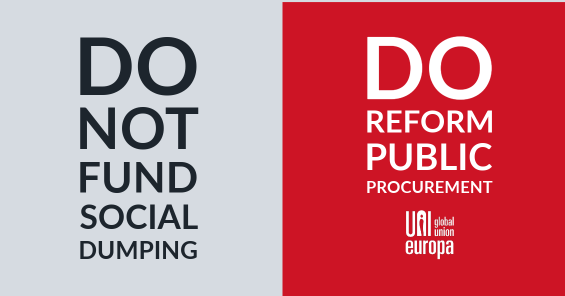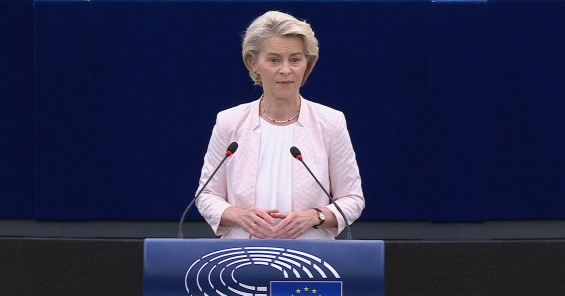Public procurement debate in European Parliament: “Do not fund social dumping!”
12.01.24
A European Parliament plenary debate on 15 January will see Members of European Parliament urge the European Commission to revise the Public Procurement Directive. The main sticking point? The Commission is allowing social criteria and collective agreements to be considered discriminatory measures in public procurement.

On Monday, 15 January 2024, Members of the European Parliament (MEPs) will debate an oral question on “the role of social award criteria in public procurement in strengthening social rights, good working conditions and inclusive labour markets Commission” during a plenary session in Strasbourg.
All too often, public money is fuelling a social race-to-the-bottom. All too often, public contracts are awarded solely based on the lowest price. And all too often, this comes at the expense of workers.
The European Parliament debate will mark the latest step in UNI Europa’s campaign to expose the problems of the EU’s Public Procurement Directive. To name just a few:
- Decency a discriminatory measure? A recent European Parliament report underlined the legal uncertainty as to whether social criteria and collective bargaining could be considered discriminatory measures in a public contract. Would a public authority dare to set high and ambitious standards for a public tender if they fear they might be sued for it? Probably not. In the plenary debate, the Commission will be asked if it will consider revising the Public Procurement Directive to eliminate this uncertainty.
- Are fundamental international labour rights optional? You would expect that violations of labour rights on public contracts would be unacceptable. However, in reality it is not obligatory to end a tender after labour violations have occurred. Worse still, the respect for ILO Conventions cannot be used as a mandatory exclusion criterion before the contractor is selected. In the plenary debate, the Commission will be asked if it will take measures to ensure that a bad contractor can be excluded from future tenders when fundamental ILO Conventions have not been respected in the past.
- Who’s responsible? Endless subcontractor chains extending all around the world make violations difficult to catch and responsibility easy to ignore. The current directive does not have a sufficient answer to this problem. In the plenary debate, the Commission will be asked if it will promote joint and several liability and/or limit subcontracting chains.
Multiple institutions have criticised the shortcomings of the Public Procurement directive:
- The European Commission is well aware that its voluntary approach to social public procurement is not sufficient. On the subject of green public procurement, it has openly stated that “compared to a voluntary approach, mandatory criteria or targets will ensure that the leverage of public spending to boost demand for better performing products is maximised”.
- A 2023 European Court of Auditors’s report found that promoting strategic procurement to encourage greater consideration of environmental, social or innovative aspects has had a limited impact, and the share of procedures using award criteria other than price is very limited despite the 2014 public procurement reform. The report concludes that the 2014 reform of the Public Procurement Directive has had no demonstrable effect;
- The EMPL committee study on the social impact of public procurement from September 2023 highlighted the limitations the directive sets on following collective agreement. It therefore recommends to “revise and clarify the mandatory social clause, by explicitly stating that collective agreements can never be considered a discriminatory measure in public contracts.”;
- In a European Parliament public hearing in October 2023, organised by the EMPL committee on social public procurement, several experts and MEPs called on the revision of the Public Procurement Directive to end the legal uncertainty of the use of collective agreements in public procurement criteria (summary article, programme, online streaming);
- In a European Parliament public hearing in December 2021 organised by the IMCO committee on sustainable public procurement, several experts and MEPs called out the shortcomings of the Public Procurement Directive, stated that the voluntary approach to reach social and green sustainable procurement is not enough and that a revision of the directive is needed (summary article, programme, online streaming);
- Employers and trade unions from labour-intensive sectors have published joint statements calling on the European Commission to adjust the public procurement rules to ensure that public contracts are only awarded to companies that are party to or adhere to the national collective agreements (cleaning, security and catering);
The review of the public procurement directive is long overdue. The review report that could propose a legal act to revise the Public Procurement Directive was scheduled for 2019. This was postponed until 2021. In 2021, the European Commission further postponed the process until 2024, arguing that it will take experts three years to prepare the review report of the Public Procurement Directive.
Now, a broad coalition of institutions, trade unions, employers, experts and parliamentarians is calling on the European Commission to reform the directive. Support the campaign to reform public procurement and tell the European Commission “Do not fund social dumping!” on X.
You may also be interested in

Von der Leyen’s public procurement reform must lift workers’ living standards
19.07.24
Press Release
Meetings & Events
2024
10
Sep
Protected: UNI Europa FATIMA Project – 3rd Steering Group Meeting – 10 September 2024
Commerce
ICT & Related Services
Property Services
